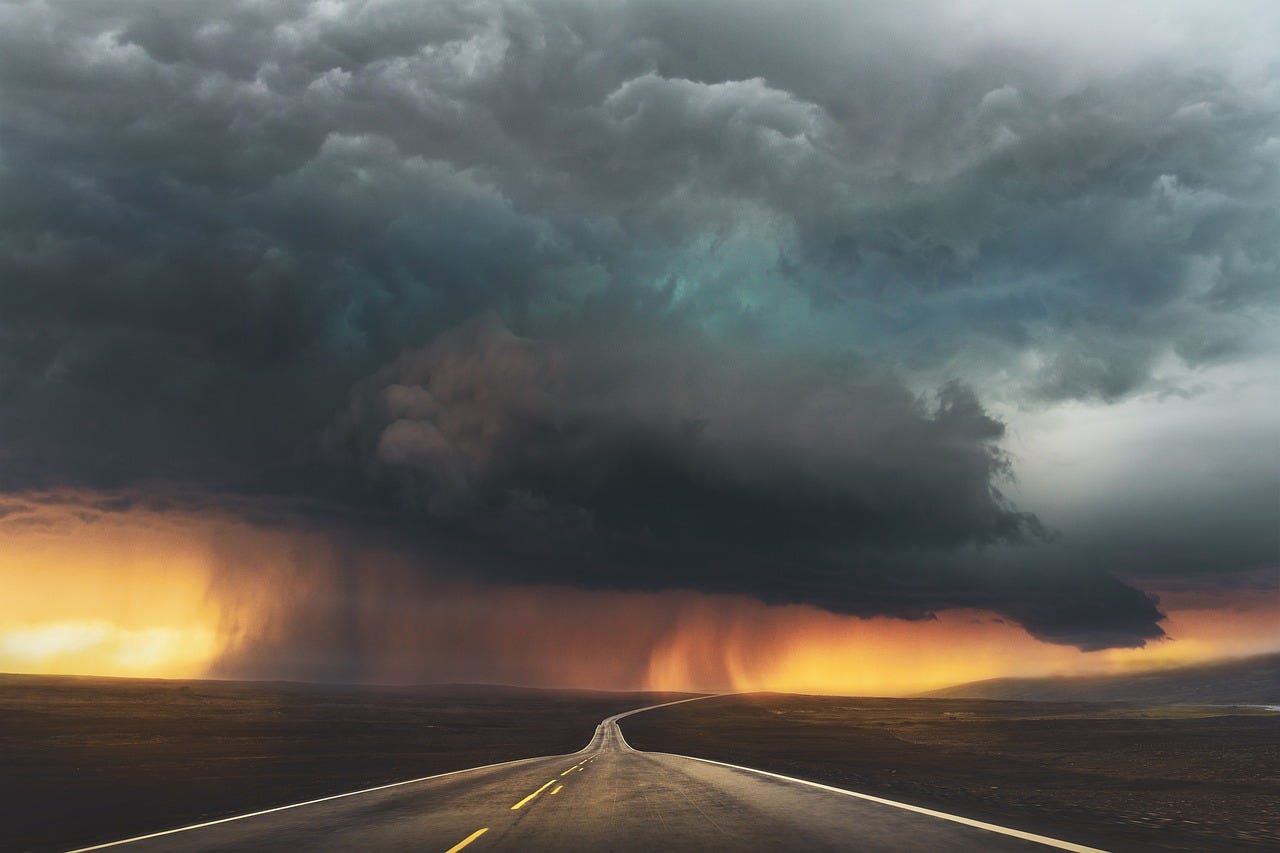The national security threat of that Chinese EV sneaking up behind you
Welcome to Callaway Climate Insights, and our first Feb. 29 edition. Happy Leap Year to all who celebrate.
Today’s edition is free. To read our insights and support our great climate finance journalism five days a week, subscribe now for full access.
Leap year math: Earth takes about 365.2422 days to make one revolution around the Sun — 6 hours longer than the 365 days that we typically include in a calendar year. So, every four years we have about 24 extra hours that we add to the calendar at the end of February in the form of leap day. Above, an orbital sunrise seen from the International Space Station as it orbited 260 miles above the Pacific. Photo: NASA.
First it was Chinese weather balloons, now it’s their electric vehicles. The Biden Administration’s declaration Thursday that Chinese EVs are a national security risk lays out a stark threat to American drivers and highways.
The idea that Chinese EVs are collecting data on how many times we change lanes without using our indicators or how many Wendy’s we pass on the way to grandma’s is apparently too much for U.S. intelligence authorities. Forget Google’s Street View, which has been driving around spying on us for a decade now. Any sighting of a BYD Qin Plus in our neighborhoods going forward is likely to invite a rapid police response.
Actually, the move by the administration makes all sorts of sense — politically. It stems, for the time being, a rising panic among U.S. auto workers and car companies that China is about to invade the U.S. market with its best-selling EVs through Mexico. BYD is the largest-selling EV maker in the world and is beginning to move into the European market. Just Wednesday, it said it is looking for a plant in Mexico to start selling in that market, possibly prompting the Biden response.
It’s a quick way to lock up the auto vote, and to prevent Donald Trump from making it his own in the election campaign. Good for Tesla TSLA 0.00%↑ , too, we imagine. Bad for anyone looking for an inexpensive EV, of course. But, well, national security.
The action is expected to be only the first of a series of aggressive steps against Chinese EVs, including increasing existing tariffs on them and further prohibiting Chinese auto parts from being used in American-made EVs. Next step, Chinese solar panels and their data collection threat to our homes.
Don’t forget to contact me directly if you have suggestions or ideas at dcallaway@callawayclimateinsights.com.
Follow us . . . .
Twitter | LinkedIn | Facebook | Instagram
Zeus: The Scope 3 train has left the station, Gary Gensler

. . . . As the Securities and Exchange Commission gears up for a vote next week on its long-awaited climate disclosure rules, expectations are high that SEC Commissioner Gary Gensler will ditch the controversial requirement for big companies to report on emissions from their supply chains, known as Scope 3 reporting. But David Callaway writes that while the SEC has dithered over political threats to the new rules for months, more than half of large U.S. companies are already starting to report their emissions. Why? Because investors want the data. . . .
Thursday’s subscriber insights

EVs are no longer at the core of Apple's business
. . . . There are at least two reasons Apple AAPL 0.00%↑ has abandoned its efforts of more than a decade trying to develop its own electric vehicle. First, there’s that slowdown in EV sales growth. Plus, AI is booming and the tech giant may well want to focus on that area as the space where it will put its time and money. Read more here. . . .
JBS plans for NYSE listing suffer blow after New York state sues
. . . . JBS USA, the U.S. arm of Brazilian meat-packing giant JBS, had its hopes for a listing on the New York Stock Exchange just about extinguished this week after the New York State Attorney General sued the company for greenwashing over its climate claims in the past few years.
The company was already under fire from both U.S. and British lawmakers, who opposed its listing because of its deforestation practices in the Amazon. Now the New York AG’s suit, which alleges false claims about reducing emissions to net zero by 2040, has pretty much killed the listing. The $50 billion company had hoped for a listing by the second half of this year.
JBS’s American depository receipts, traded on the over-the-counter markets, are down about 9% year-to-date.
There is little chance the SEC will vote to let JBS list after this latest suit, but the idea that regulators will consider climate change in enforcement actions — and inactions — is refreshing at a time when many are backing down from taking on anti-climate forces.
Of course, if the company in question was U.S.-based Tyson TSN 0.00%↑ or Cargill, the reaction might be different.
Editor’s picks: Ocean currents weaken; plus, hot, hot, hot in February
Watch the video: Ocean waters are constantly on the move, traveling far distances in complex currents that regulate Earth’s climate and weather patterns. How might climate change impact this critical system? Oceanographer Susan Lozier dives into the data, which suggests that ocean overturning may slow as our climate warms — and takes us on board the international effort to track these changes and set us on the right course while we still have time.
Warmest February on record
It’s possible we’ve just seen the warmest February on record. And if that turns out to be the case, it would be the ninth month in a row when the monthly temperature record was broken. With temps around 100°F in Texas, and signs of an early spring for the northern hemisphere, it’s not surprising February is on track to have the highest global average temperature ever recorded for that month, Reuters reports. NOAA, U.S. National Oceanic and Atmospheric Administration, is expected to report on the official figures for February in mid-March. Climate change and the El Nino event in the Eastern Pacific Ocean are the culprits, scientists say. According to the report, NOAA predicts there is a 22% chance that 2024 will break last year’s record as the hottest year, and there is a 99% chance it will be in the top five.
Latest findings: New research, studies and projects

Climate change and wealth: improving ‘climate capabilities’
The richest 10% of the population account for over half of global emissions, but the impacts of climate change will affect them the least, note the authors of Climate Change and Wealth: Understanding and Improving the Carbon Capability of the Wealthiest People in the UK. This paper addresses this problem by applying the concept of carbon capability to investigate the role that wealthy people play in the context of climate change, and to identify opportunities to develop fair and equitable climate policies. From the abstract: “We draw on a comprehensive, nationally representative survey of UK households with more than 300 measures, and combine this with in-depth interviews with individuals defined as being in the wealthiest decile in the UK. Our findings indicate that besides their high consumption-based emissions, wealthy people possess several carbon capabilities compared to the rest of the population, including knowledge and awareness about climate change, the capacity to rapidly adopt low-carbon technologies, high levels of support for climate policies, and the ability to exert climate-positive influence amongst their social and professional networks.” The difficulty, according to the authors, is motivation. Authors: Hettie Moorcroft, University of Bath, Faculty of Humanities & Social Sciences, Department of Economics; Sam Hampton, Oxford University; University of Bath; Lorraine Whitmarsh, University of Bath.
More of the latest research:
Words to live by . . . .
“We’ve all felt and seen the impacts — baking heat, intense storms, vanishing nature and species, failing soils, deadly dirty air, oceans stuffed with plastic waste and much more. These impacts fall hardest upon the poor and vulnerable, who are least responsible for them, but nobody is immune.” — Inger Andersen, Under-Secretary-General of the UN, executive director of the UN Environment Programme.



